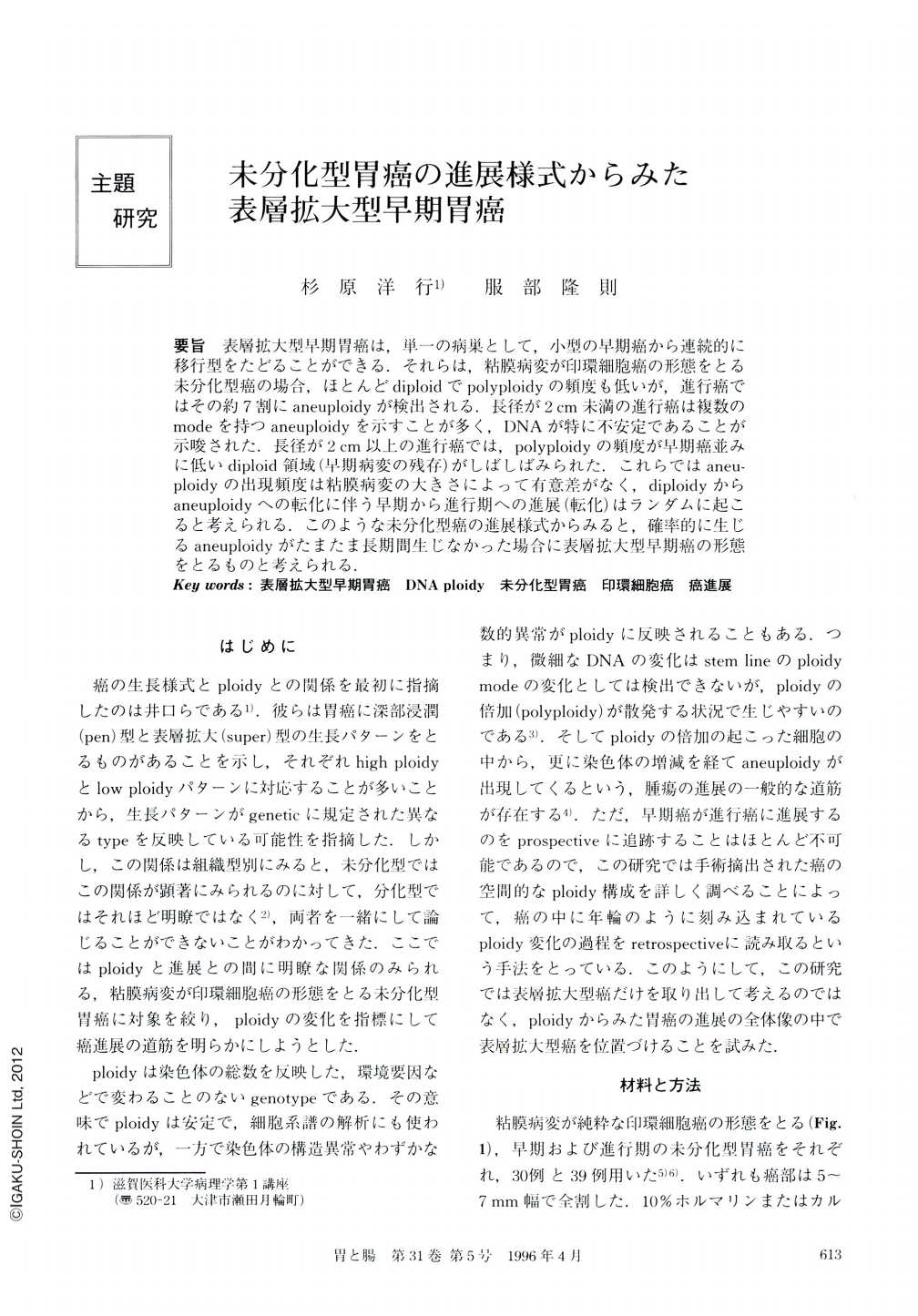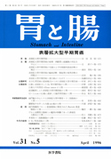Japanese
English
- 有料閲覧
- Abstract 文献概要
- 1ページ目 Look Inside
- サイト内被引用 Cited by
要旨 表層拡大型早期胃癌は,単一の病巣として,小型の早期癌から連続的に移行型をたどることができる.それらは,粘膜病変が印環細胞癌の形態をとる未分化型癌の場合,ほとんどdiploidでpolyploidyの頻度も低いが,進行癌ではその約7割にaneuploidyが検出される.長径が2cm未満の進行癌は複数のmodeを持つaneuploidyを示すことが多く,DNAが特に不安定であることが示唆された.長径が2cm以上の進行癌では,polyploidyの頻度が早期癌並みに低いdiploid領域(早期病変の残存)がしばしばみられた.これらではaneuploidyの出現頻度は粘膜病変の大きさによって有意差がなく,diploidyからaneuploidyへの転化に伴う早期から進行期への進展(転化)はランダムに起こると考えられる.このような未分化型癌の進展様式からみると,確率的に生じるaneuploidyがたまたま長期間生じなかった場合に表層拡大型早期癌の形態をとるものと考えられる.
It was first pointed out by Inokuchi et al. that superficially-spreading and penetrating cancers may reflect a difference of genetic constitution as they correlated to different ploidy patterns. Further studies, however, revealed that such a correlation is seen typically in undifferentiated-type gastric cancers and is obscure in the differentiated-type. In this study, we confined our materials to undifferentiated-type cancer of which the mucosal lesion showed signet-ring cell carcinoma (30 early and 39 advanced cancers) and we attempted to clarify the significance of superficially-spreading early cancers in the overall progression of undifferentiated-type gastric cancers by mapping the cytometrically determined ploidy of metaphase cells in the individual cancers and correlating the ploidy constitution to the stage and the size of the mucosal spread. Our results are as follows; (1) Aneuploidy was detected in one of 30 (3%) early cancers and 27 of 39 (69%) advanced cancers and was almost always accompanied by diploid cancer cells in the mucosa, suggesting that advanced cancers with aneuploidy may be preceded by diploid early cancers. (2) There is some evidence that the incidence of polyploidy reflects the degree of chromosomal instability. In purely diploid areas of advanced cancers, the incidence of polyploidy was 20~30%, being as low as that of diploid early cancers. These areas are suggested to be residual“early”lesions. (3) The incidence of aneuploid foci was constant irrespective of the size of the mucosal spread of the advanced cancers of which the mucosal spreads were 2 cm or more in greatest diameter. Thus, provided that undifferentiated type gastric cancers are monoclonal in origin, aneuploidy may occur in a stochastic process (not only in an incipient stage of cancer growth) and the diversity in growth pattern of stomach cancer can be ascribed to variability in the time when aneuploidy occurs in the tumor. From this point of view, superficially spreading“early”cancer is suspected to be the diploid cancer that remains in an“early”stage for a long time simply because the aneuploid evolution has not yet occurred.

Copyright © 1996, Igaku-Shoin Ltd. All rights reserved.


